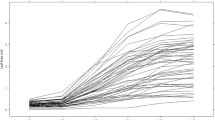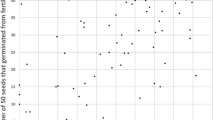Abstract
Methods for diploid true potato seed (TPS) production and handing are crucial for inbred-hybrid potato breeding. This study determined the effects of mother plant nutrition on average TPS weight and germination kinetics as modeled by Gompertz curves. Additionally, it characterized germination of stratified TPS and TPS imbibed in water or gibberellic acid (GA3). Seeds were produced by three interspecific hybrids between diploid relatives of cultivated potato and diploid lines derived from cultivated potato. Effects of stratification on seed dormancy and germination rate were genotype-dependent. With one exception, GA3-treated seeds reached 50% germination as fast or faster than stratified seeds and seeds imbibed in water. Mother plant nutrition was varied by fertilizing with two nutrient solutions that differed in composition. Effects of fertilizer type on germination were modest, and 100-seed weight did not differ between fertilizer types. These findings support previous research showing that GA3 treatment effectively promotes robust TPS germination.
Resumen
Los métodos para la producción y manejo de semillas de papa verdadera diploides (TPS) son cruciales para el mejoramiento de papa híbrida endogámica. Este estudio determinó los efectos de la nutrición de las plantas madre en el peso promedio de TPS y la cinética de germinación según lo modelado por las curvas de Gompertz. Además, caracterizó la germinación de TPS estratificada y TPS embebidas en agua o en ácido giberelico (GA 3). Las semillas se produjeron por tres híbridos interespecíficos entre parientes diploides de papa cultivada y líneas diploides derivadas de la papa cultivada. Los efectos de la estratificación en la latencia de las semillas y la tasa de germinación dependieron del genotipo. Con una excepción, las semillas tratadas con GA 3 alcanzaron el 50% de germinación tan rápido o más rápido que las semillas estratificadas y que las que se embebieron en agua. La nutrición de las plantas madre varió al fertilizar con dos soluciones nutritivas que difirieron en composición. Los efectos del tipo de fertilizante en la germinación fueron modestos, y el peso de 100 semillas no difirió entre los tipos de fertilizantes. Estos hallazgos apoyan investigaciones anteriores que muestran que el tratamiento GA 3 promueve eficazmente la germinación robusta de TPS.



Similar content being viewed by others
References
Alboresi, A., C. Gestin, M.T. Leydecker, M. Bedu, C. Meyer, and H.N. Truong. 2005. Nitrate, a signal relieving seed dormancy in Arabidopsis. Plant, Cell and Environment 28: 500–512. https://doi.org/10.1111/j.1365-3040.2005.01292.x.
Almekinders, C.J.M., E. Chujoy, and G. Thiele. 2009. The use of true potato seed as pro-poor technology: The efforts of an international agricultural research institute to innovating potato production. Potato Research 52: 275–293. https://doi.org/10.1007/s11540-009-9142-5.
Alpers, R., and S. Jansky. 2019. Diploid true potato seed: Relationships among seed weight, germination, and seedling vigor. American Journal of Potato Research 96: 217–224. https://doi.org/10.1007/s12230-018-9675-8.
Alvarado, V., and K.J. Bradford. 2005. Hydrothermal time analysis of seed dormancy in true (botanical) potato seeds. Seed Science Research 15: 77–88. https://doi.org/10.1079/ssr2005198.
Bamberg, J.B. 1999. Dependence on exogenous gibberellin for seed germination in Solanum acaule bitter and other Solanum (potato) species. American Journal of Potato Research 76: 351–355. https://doi.org/10.1007/bf02910008.
Bamberg, J.B., R.E. Hanneman, and L.E. Towill. 1986. Use of activated charcoal to enhance the germination of botanical seeds of potato. American Potato Journal 63: 181–189.
Baskin, J.M., and C.C. Baskin. 1985. The annual dormancy cycle in buried weed seeds: A continuum. BioScience 35: 492–498. https://doi.org/10.2307/1309817.
Beligni, M.V., and L. Lamattina. 2000. Nitric oxide stimulates seed germination and de-etiolation, and inhibits hypocotyl elongation, three light-inducible responses in plants. Planta 210: 215–221. https://doi.org/10.1007/PL00008128.
Bethke, P.C., F. Gubler, J.V. Jacobsen, and R.L. Jones. 2004. Dormancy of Arabidopsis seeds and barley grains can be broken by nitric oxide. Planta 219: 847–855. https://doi.org/10.1007/s00425-004-1282-x.
Bethke, P.C., I.G.L. Libourel, and R.L. Jones. 2006. Nitric oxide reduces seed dormancy in Arabidopsis. Journal of Experimental Botany 57: 517–526. https://doi.org/10.1093/jxb/erj060.
Bewley, J.D. 1997. Seed germination and dormancy. The Plant Cell 9: 1055–1066.
Brown, R.F., and D.G. Mayer. 1988. Representing cumulative germination. 2. The use of the Weibull function and other empirically derived curves. Annals of Botany 61: 127–138.
Brown, N.A.C., and J.V. Staden. 1973. The effect of stratification on the endogenous cytokinin levels of seed of Protect compacta and Leucadendron daphnoides. Physiologia Plantarum 28: 388–392. https://doi.org/10.1111/j.1399-3054.1973.tb08576.x.
Çetinbaş, M., and F. Koyuncu. 2018. Improving germination of Prunus avium L. seeds by gibberellic acid, potassium nitrate and thiourea. Horticultural Science 33: 119–123. https://doi.org/10.17221/3750-hortsci.
Chujoy, E., and R. Cabello. 2007. The canon of potato science: 29. True potato seed (TPS). Potato Research 50: 323–325. https://doi.org/10.1007/s11540-008-9058-5.
Dayal, T.R., M.D. Upadhya, and S.N. Chaturvedi. 1984. Correlation studies on 1000-true-seed weight, tuber yield and other morphological traits in potato (Solanum tuberosum L.). Potato Research 27: 185–188. https://doi.org/10.1007/BF02357463.
Delouche, J.C., and N.T. Nguyen. 1964. Methods for overcoming seed dormancy in rice. Proceedings of the Association of Official Seed Analysts 54: 41–49.
Finch-Savage, W.E., and G. Leubner-Metzger. 2006. Seed dormancy and the control of germination. 2006. The New Phytologist 171: 501–523. https://doi.org/10.1111/j.1469-8137.2006.01787.x.
Graeber, K., K. Nakabayashi, E. Miatton, G. Leubner-Metzger, and W.J.J. Soppe. 2012. Molecular mechanisms of seed dormancy. Plant, Cell and Environment 35: 1769–1786. https://doi.org/10.1111/j.1365-3040.2012.02542.x.
Horton, D. 1987 Potatoes: Production, marketing, and programs for developing countries. Westview press, Boulder and IT Publications, London, 243 pp.
Hosaka, K., and R.E. Hanneman. 1998a. Genetics of self-compatibility in a self-incompatible wild diploid potato species Solanum chacoense. 1. Detection of an S locus inhibitor (Sli) gene. Euphytica 99: 191–197. https://doi.org/10.1023/A:1018353613431.
Hosaka, K., and R.E. Hanneman. 1998b. Genetics of self-compatibility in a self-incompatible wild diploid potato species Solanum chacoense. 2. Localization of an S locus inhibitor (Sli) gene on the potato genome using DNA markers. Euphytica 103: 265–271. https://doi.org/10.1023/A:1018353613431.
Jansky, S.H., A.O. Charkowski, D.S. Douches, G. Gusmini, C. Richael, P.C. Bethke, D.M. Spooner, R.G. Novy, H. de Jong, W.S. de Jong, J.B. Bamberg, A.L. Thompson, B. Bizimungu, D.G. Holm, C.R. Brown, K.G. Haynes, V.R. Sathuvalli, R.E. Veilleux, J.C. Miller Jr., J.M. Bradeen, and J. Jiang. 2016. Reinventing potato as a diploid inbred line-based crop. Crop Science 56: 1412–1422. https://doi.org/10.2135/cropsci2015.12.0740.
Jansky, S.H., and S.J. Peloquin. 2006. Advantages of wild diploid Solanum species over cultivated diploid relatives in potato breeding programs. Genetic Resources and Crop Evolution 53: 669–674. https://doi.org/10.1007/s10722-004-2949-7.
Kahm, M., G. Hasenbrink, H. Lichtenberg-Fraté, J. Ludwig, and M. Kschischo. 2010. Grofit: Fitting biological growth curves with R. Journal of Statistical Software 33: 1–21. https://doi.org/10.18637/jss.v033.i07.
Karimmojeni, H., A.H. Bazrafshan, M.M. Majidi, S. Torabian, and B. Rashidi. 2014. Effect of maternal nitrogen and drought stress on seed dormancy and germinability of Amaranthus retroflexus. Plant Species Biology 29: E1–E8. https://doi.org/10.1111/1442-1984.12022.
Koyuncu, F. 2005. Breaking seed dormancy in black mulberry (Morus nigra L.) by cold stratification and exogenous application of gibberellic acid. Acta Biologica Cracoviensia Series Botanica 9: 1055–1066.
Kucera, B., A.C. Marc, and G. Leubner-Metzger. 2005. Plant hormone interactions during seed dormancy release and germination. Seed Science Research 15: 281–307. https://doi.org/10.1079/ssr2005218.
Lam, S.L. 1968. Interaction of temperature and gibberellin on potato seed germination. American Journal of Botany 55: 193–198.
Lam, S.L., and H.T. Erickson. 1966. Interaction of light and gibberellin on potato seed germination. American Potato Journal 43: 443–449. https://doi.org/10.1007/BF02862733.
Leubner-Metzger, G. 2003. Functions and regulation of β-1,3-glucanases during seed germination, dormancy release and after-ripening. Seed Science Research 13: 17–34. https://doi.org/10.1079/ssr2002121.
Lindhout, P., D. Meijer, T. Schotte, R.C.B. Hutten, R.G.F. Visser, and H.J. van Eck. 2011. Towards F 1 hybrid seed potato breeding. Potato Research 54: 301–312. https://doi.org/10.1007/s11540-011-9196-z.
Muthoni, J., H. Shimelis, and R. Melis. 2013. Alleviating potato seed tuber shortage in developing countries: Potential of true potato seeds. Australian Journal of Crop Science 7: 1946–1954.
Pallais, N. 1989. Osmotic priming of true potato seed: Effects of seed age. Potato Research 32: 235–244. https://doi.org/10.1007/BF02358239.
Pallais, N., N. Fong, R. Garcia, and J. Santos-Rojas. 1990. Factors affecting seedling vigor in potatoes: II. Genotype, dormancy, and pre-sowing treatments. American Potato Journal 67: 109–119. https://doi.org/10.1007/BF02990960.
Phartyal, S.S., R.C. Thapliyal, J.S. Nayal, and G. Joshi. 2003. Storage of Himalayan maple (Acer caesium) seed: A threatened tree species of the Central Himalayas. Seed Science and Technology 31: 149–159. https://doi.org/10.15258/sst.2003.31.1.15.
R Foundation for Statistical Computing. 2019. R: A language and environment for statistical computing. Available at: http://www.r-project.org/. Accessed 8 Mar 2021.
Schütz, W., and G. Rave. 1999. The effect of cold stratification and light on the seed germination of temperate sedges (Carex) from various habitats and implications for regenerative strategies. Plant Ecology 144: 215–230. https://doi.org/10.1023/A:1009892004730.
Scott, S.J., R.A. Jones, and W.A. Williams. 1984. Review of data analysis methods for seed germination 1. Crop Science 24 (6): 1192–1199. https://doi.org/10.2135/cropsci1984.0011183X002400060043x.
Simmonds, N.W. 1963. Experiments on the germination of potato seeds. I. European Potato Journal 6: 69–76. https://doi.org/10.1007/BF02365215.
Spicer, P.B., and L.A. Dionne. 1961. Use of gibberellin to hasten germination of Solanum seed. Nature 189: 327–328.
Taylorson, R.B., and S.B. Hendricks. 1979. Overcoming dormancy in seeds with ethanol and other anesthetics. Planta 145: 507–510.
De Vries, M., M.T. Maat, and P. Lindhout. 2016. The potential of hybrid potato for East-Africa. Open Agriculture 1: 151–156. https://doi.org/10.1515/opag-2016-0020.
Wartidiningsih, N., R.L. Geneve, and S.T. Kester. 1994. Osmotic priming or chilling stratification improves seed germination of purple coneflower. HortScience 29: 1445–1448. https://doi.org/10.21273/hortsci.29.12.1445.
Funding
Partial funding for this research was provided by USDA NIFA Specialty Crop Research Initiative grant (2019–51181–30021). Additional funding was provided by the Japan Public–Private Partnership Student Study Abroad Program (TOBITATE).
Author information
Authors and Affiliations
Corresponding author
Rights and permissions
About this article
Cite this article
Nashiki, A., Jansky, S.H. & Bethke, P.C. The Effect of Mother Plant Fertilization and Stratification on the Germination of True Potato Seed. Am. J. Potato Res. 98, 194–201 (2021). https://doi.org/10.1007/s12230-021-09830-7
Accepted:
Published:
Issue Date:
DOI: https://doi.org/10.1007/s12230-021-09830-7




